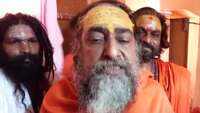
SRINAGAR: At 10, Aaliya Tariq can't understand the fuss over her becoming the first J&K resident to receive a domicile certificate online. But 40-something Baby Gul (name changed) can. She's waited all her married life to reclaim the feeling that she belongs.
"For all the trials and tribulations of the past year, this August 5 will be a reiteration of the one good thing to come of it," Baby, a resident of Srinagar, told TOI. "I am back to being a Kashmiri with the same rights as anyone else, irrespective of my status as the spouse of a UP native. I can finally accept the inheritance my father bequeathed me."
Amid the continuing debate over the intricacies and implications of the new domicile law that was set in motion exactly a year ago, women like Baby – and their daughters – are quietly celebrating what they see as a blow for gender equality in the Valley. "My husband may be from somewhere else but he's been working as a medical professional in a government institution here for 30 years. Being married to him doesn't make me an outsider. I no longer have to worry about our two daughters losing their domicile status someday," Baby said.
In north Kashmir’s Sopore, little Aaliya's father Tariq Ahmed Longoo applied for a domicile certificate for her because he thinks it is "a very important document like Aadhaar that everyone should possess". The certificate, issued on June 22, not only guarantees Aaliya the right to inheritance, but to her future progeny as well.
Compared to Jammu, where nearly four lakh people have so far acquired domicile certificates, just about 80,000 applicants in Kashmir division have received theirs. Between 2 and 3% of them would be women married to spouses from outside J&K, official sources said.
Among them is Dr Parveen Sheikh (name changed), who flew to Srinagar from Delhi the moment domestic flights resumed after the first phase of the lockdown so that she could immediately apply for her certificate. Married to a doctor whose roots are in UP's Sambhal, Parveen now not only has a residency document recognising her roots but is also the "proud owner of a piece of property my late father had always wanted me to inherit".
Reenu Nanda, who teaches at Jammu University, sees the domicile law as more than just proof of residency. “At the very least, the new domicile rules have changed the status of J&K women who choose to marry non-locals. This has restored their pride as daughters of the soil," she said.
Supreme Court lawyer Charu Wali Khanna, a Kashmir Pandit, and activist Manu Khajuria, another "local" married to an "outsider", were among those who had campaigned against Article 35A and challenged provisions in the erstwhile J&K Constitution that were loaded against women.
Not that daughters of VIPs received any favours. Former CM Mufti Mohammad Sayeed's younger daughter Rubaiya Sayeed being married to a non-local made her ineligible to own property in J&K. Ditto former CM Farooq Abdullah's daughter and Omar Abdullah's sister Sara, who is married to Congress's Sachin Pilot.
While the law has since changed, many Kashmiris still see the new domicile certificate benefitting none except a few thousand local women married to "non-residents", as defined by the old rules. Iltija Mufti, daughter of incarcerated PDP president and former CM Mehbooba Mufti, tweeted: “J&K’s new domicile law is part of a diabolical demographic project that began on 5th August with Article 370 abrogation. Imposing it in times of a global pandemic reveals a callous & paranoid mindset willfully violating consent to ensure subjugation.”
Mubeen Shah, a Kashmiri businessman, is one of those campaigning against the domicile law. In his last post on social media, he said, “All village/mohalla/town committees of Kashmir should come together and make sure that not a single non-local lives in their areas. They should ask all non-Kashmiris to vacate and leave Kashmir. Each and every local committee must do its part.”
J&K Police booked Shah for inciting violence, although he is already out on parole.
According to Labha Ram Gandhi, chairman of the West Pakistan Refugees Action Committee, nearly one lakh Pakistani refugees who migrated to J&K during Partition are now entitled to domicile certificates that would automatically grant them the right to government jobs, among other privileges.
Similarly , the Valmiki Samaj community that was brought here in 1957 from Gurdaspur and Amritsar on the assurance of the then J&K PM Bakshi Ghulam Mohammed has had to wait 62 years for a document that has come to define the shift that started on August 5, 2019.
"For all the trials and tribulations of the past year, this August 5 will be a reiteration of the one good thing to come of it," Baby, a resident of Srinagar, told TOI. "I am back to being a Kashmiri with the same rights as anyone else, irrespective of my status as the spouse of a UP native. I can finally accept the inheritance my father bequeathed me."
Amid the continuing debate over the intricacies and implications of the new domicile law that was set in motion exactly a year ago, women like Baby – and their daughters – are quietly celebrating what they see as a blow for gender equality in the Valley. "My husband may be from somewhere else but he's been working as a medical professional in a government institution here for 30 years. Being married to him doesn't make me an outsider. I no longer have to worry about our two daughters losing their domicile status someday," Baby said.
In north Kashmir’s Sopore, little Aaliya's father Tariq Ahmed Longoo applied for a domicile certificate for her because he thinks it is "a very important document like Aadhaar that everyone should possess". The certificate, issued on June 22, not only guarantees Aaliya the right to inheritance, but to her future progeny as well.
Compared to Jammu, where nearly four lakh people have so far acquired domicile certificates, just about 80,000 applicants in Kashmir division have received theirs. Between 2 and 3% of them would be women married to spouses from outside J&K, official sources said.
Among them is Dr Parveen Sheikh (name changed), who flew to Srinagar from Delhi the moment domestic flights resumed after the first phase of the lockdown so that she could immediately apply for her certificate. Married to a doctor whose roots are in UP's Sambhal, Parveen now not only has a residency document recognising her roots but is also the "proud owner of a piece of property my late father had always wanted me to inherit".
Reenu Nanda, who teaches at Jammu University, sees the domicile law as more than just proof of residency. “At the very least, the new domicile rules have changed the status of J&K women who choose to marry non-locals. This has restored their pride as daughters of the soil," she said.
Supreme Court lawyer Charu Wali Khanna, a Kashmir Pandit, and activist Manu Khajuria, another "local" married to an "outsider", were among those who had campaigned against Article 35A and challenged provisions in the erstwhile J&K Constitution that were loaded against women.
Not that daughters of VIPs received any favours. Former CM Mufti Mohammad Sayeed's younger daughter Rubaiya Sayeed being married to a non-local made her ineligible to own property in J&K. Ditto former CM Farooq Abdullah's daughter and Omar Abdullah's sister Sara, who is married to Congress's Sachin Pilot.
While the law has since changed, many Kashmiris still see the new domicile certificate benefitting none except a few thousand local women married to "non-residents", as defined by the old rules. Iltija Mufti, daughter of incarcerated PDP president and former CM Mehbooba Mufti, tweeted: “J&K’s new domicile law is part of a diabolical demographic project that began on 5th August with Article 370 abrogation. Imposing it in times of a global pandemic reveals a callous & paranoid mindset willfully violating consent to ensure subjugation.”
Mubeen Shah, a Kashmiri businessman, is one of those campaigning against the domicile law. In his last post on social media, he said, “All village/mohalla/town committees of Kashmir should come together and make sure that not a single non-local lives in their areas. They should ask all non-Kashmiris to vacate and leave Kashmir. Each and every local committee must do its part.”
J&K Police booked Shah for inciting violence, although he is already out on parole.
According to Labha Ram Gandhi, chairman of the West Pakistan Refugees Action Committee, nearly one lakh Pakistani refugees who migrated to J&K during Partition are now entitled to domicile certificates that would automatically grant them the right to government jobs, among other privileges.
Similarly , the Valmiki Samaj community that was brought here in 1957 from Gurdaspur and Amritsar on the assurance of the then J&K PM Bakshi Ghulam Mohammed has had to wait 62 years for a document that has come to define the shift that started on August 5, 2019.
Download
The Times of India News App for Latest India News

Coronavirus outbreak
Trending Topics
LATEST VIDEOS
India
 Meet Haryana’s Pradeep Singh, who topped 2019 UPSC exams
Meet Haryana’s Pradeep Singh, who topped 2019 UPSC exams  After 492 years, our dream comes true: Spiritual leaders express happiness ahead of Ram temple bhoomi pujan
After 492 years, our dream comes true: Spiritual leaders express happiness ahead of Ram temple bhoomi pujan  PoK: Higher education remains elusive amid continuous systemic harassment
PoK: Higher education remains elusive amid continuous systemic harassment  Bhoomi Pujan: Students make massive 3300 square feet long rangoli of Ayodhya temple and Lord Ram
Bhoomi Pujan: Students make massive 3300 square feet long rangoli of Ayodhya temple and Lord Ram  Ram temple event: Devotees perform Hanuman Chalisa, light lamps on eve of Foundation laying ceremony
Ram temple event: Devotees perform Hanuman Chalisa, light lamps on eve of Foundation laying ceremony  Covid-19: Govt procuring 60,000 ventilators, 96% are made in India, says Health ministry
Covid-19: Govt procuring 60,000 ventilators, 96% are made in India, says Health ministry
More from TOI
Navbharat Times
Featured Today in Travel
Quick Links
Coronavirus in MumbaiCoronavirus in KolkataCoronavirus in HyderabadCoronavirus in DelhiCoronavirus in BangaloreCoronavirus symptomsCoronavirus in IndiaWhat is CoronavirusCoronavirus NewsSolar EclipseNPRWhat is NRCCAB BillCAB and NRCRTI BillPodcast newsLok SabhaShiv SenaYSRCPCongressBJP newsUIDAIIndian ArmyISRO newsSupreme Court
Get the app



